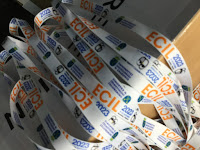Sheila here, and the keynote at ECIL today is Sociocultural Approaches to Information Literacy: Space Races, Wish-Cycling and Squabbling Siblings from Alison Hicks (University College London, UK). I'm liveblogging, so there is the usual caveat that this is my immediate impression of Hicks' talk.
Hicks asked us to cast our minds back to 2005, which she saw as an important date for Information Literacy - the publication of Information Literacy as a sociotechnical practice which she identified as signalling a change in the trajectory of IL. The article proposes that IL is embedded in and inseparable from the activities of particular groups and communities, with a constructionist approach, and shifting focus to the social and cultural (rather than seeing IL as an individual activity). Hicks mentioned some other influences that led to a sociocultural approach e.g. the work of Bruce, Lloyd or Kapitzke.
Taking 2005 as a starting date, Hicks posed a number of questions such as - what aspects of the sociocultural approach have been integrated? how have the ideas been developed? where does more work need to be done?
Hicks went on to address some of these questions through analysis that used citations (the the above article) as a jumping off point (whilst recognising that there are some limitations to this approach). In Web of Science there were 191 citing papers, 129 of which were focused on IL, narrowed down to 109 after examination. Hicks then identified the extracts relevant to her topic, coded the material and categorised those into three themes, each of which had subthemes. Note that she gave example references for each of her themes and subthemes (which would make an interesting reading list), but I wasn't able to copy these down as well for this post!
The first theme was Picking up Ideas. The first subtheme was "Beyond the academic" where authors talk about focusing on IL in contexts outside formal education (e.g. workplace, everyday or exploring IL in specific cultural/national contexts). The 2nd subtheme was "Beyond the academic curtain" (looking at the "role that context plays in shaping school or academic information literacy"). The 3rd subtheme was "Social relationships" - looking at "how social information sources shape the development of situated knowing". These sources includes people, particular spaces and social media.
The second theme was Running with the ball: expanding on ideas in the original article. The 1st subtheme was "Tools and materiality" - concentrating on the way artefacts, documents, infrastructures and tools are used in, and affect, IL practice. The 2nd subtheme was "Discursive space" - emphasising the importance of social relationships, as opposed to the individualistic idea of IL. Hicks further identified librarian/teacher narratives, cognitive authorities and positioning as foci. The 3rd subtheme was "Power" - exploring issues of authority and legitimisation, including those critiquing current models of IL and examination of barriers to developing IL.
The third theme was Seizing the Day. Firstly, Hicks identified authors who has explored specific "Activities" (e.g. sharing, storytelling, reframing, avoiding, creating or recording information/practices). The 2nd subtheme was "The body", with emphasis on embodied information and sensory information and knowledge gained through experience. The 3rd subtheme was "Challenging context" - reflecting on what context actually means, for example looking at how practice travels, transitions or changes.
Having outlined the above nine areas, Hicks moved on to the "Squabbling siblings" of her title. She reflected on how scholarly disagreements can be a productive part of the field as well as divisive, but need to be supportive/reflective rather than divisive. Hicks identified the mainstreaming of many sociocultural ideas, but warned against stgnation where there is more formulaic exploration of IL in specific contexts, or investigation of information experience in isolation.
Hicks had some finishing questions for us (apologies, I didn't manage to capture all of them!) - for example "how are our understandings of information literacy driven by wished or hoped for truths, rather than the broader consideration of the complexity and messiness of practice". What would it mean to reconceptualise IL in the light of sociocultural insights? What would it mean to centre it around evolving insights into information practice?
However Hicks noted that (on the positive side) "key sociocultural principles are shared across contexts" and she probed the implications of the professional-practice orientation of IL (including the practice-research relationship), noting the need to create spaces for more complex and nuanced conversations.
Finally, Hicks identified the sociocultural approach as a dynamic way forward!
Photo by Sheila Webber: lanyards at ECIL
Curating information literacy stories from around the world since 2005 - - - Stories identified, chosen and written by humans!
Wednesday, October 11, 2023
Sociocultural Approaches to Information Literacy #ECIL2023
Subscribe to:
Post Comments (Atom)

No comments:
Post a Comment